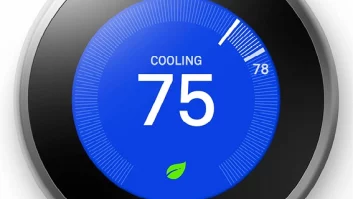
Thirteen years ago, Google introduced the Nest Learning Thermostat and now it has debuted the completely reimagined Nest Learning Thermostat (4th gen) that, for the first time, comes with a redesigned Nest Temperature Sensor (2nd gen) in the box.
The new domed crystal LCD display is 60% bigger than the previous generation and is housed behind multiple layers of mirror and colored films, completely eliminating the appearance of bezels for a long-lasting aesthetic. The new Dynamic Farsight display lets users customize the home screen to easily view the time, temperature, weather, or outdoor air quality up close and at a glance.
To complement any home interior, the thermostat is available in three metal finishes: Polished Silver, Polished Obsidian, and Polished Gold.
The Nest Learning Thermostat (4th gen) uses AI to automatically make micro-adjustments based on your patterns to keep you comfortable while saving both energy and money. Now, AI can more quickly and accurately create your personalized, energy-saving temperature schedules. With Smart Schedule, the thermostat learns which temperatures you choose most often or changes in behavior based on motion detected in your home — like coming home earlier — and automatically adjusts your temperature schedule to match. These energy-saving suggestions can be implemented automatically, or you can accept or reject them in the Google Home app so you’re always in control.
The thermostat also analyzes how the weather outdoors will affect the temperature inside. For example, if it’s a sunny winter day and your home gets warmer on its own, it will pause heating. Or, on a humid day, the indoor temperature may feel warmer than intended, so the thermostat will adjust accordingly.
Each thermostat comes with a new Nest Temperature Sensor to help you manage hot and cold spots in your home, like prioritizing the temperature in a baby’s room during naptime. You can add up to six temperature sensors for maximum control and flexibility, and you can now select multiple sensors and average the temperatures across them. You can choose which sensors are active at different times of day by linking them to your schedules.
The Nest Temperature Sensor comes in a discreet, pebble-like form that fits in any home environment. Place it on a bookshelf or hang it easily in any room by the keyhole on the back.
Homeowners know heating and cooling systems can be expensive to replace if they break. The System Health Monitor feature tracks your HVAC performance over time, sensing subtle issues and sending you alerts for problems that may require immediate attention. For example, if you turned on the AC, but your home failed to cool, you may not notice immediately. But your thermostat can send you an alert, and over time your thermostat will get even smarter about detecting potential problems based on how your system behaves.
And if you have a ventilation system, Google has introduced a new feature called Smart Ventilation. It brings in fresh air when outdoor air quality is healthy and it’s most efficient, like when temperatures are mildest. If pollutants like wildfire smoke make outdoor air quality unhealthy or temperatures are extreme, the thermostat will automatically pause ventilation.
The Nest Thermostat and help address climate change with Nest Renew. Once you enroll in Nest Renew, your thermostat can automatically make small adjustments that shift energy use to cleaner and less expensive times. These adjustments are small but add up — contributing to a more reliable and efficient energy grid while lowering household energy bills at the same time.
For more information, visit https://blog.google/products/google-nest/.
See also: Insights: The Future Of Smart Homes













